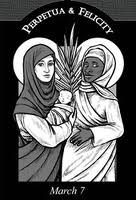
Although Rendel Harris claimed priority for the Greek text, J. Analisi del corpus martirologico donatista” (PhD diss., Università degli Studi di Padova, 2013).ġ2 This is clearly the case with the Greek version of the Passio. Catholic authors not only retooled martyr accounts to ensure they were not “misread” by Donatists, they also “Catholicized” martyr accounts that were originally Donatist texts, as Matteo Davit has recently shown: “Ecclesia martyrum. See Streete, Gail Corrington, Redeemed Bodies: Women Martyrs in Early Christianity ( Louisville: Westminster John Knox, 2009), 60 Google Scholar and Kitzler, From “Passio Perpetuae” to “Acta Perpetuae,” 90–92. Gail Corrington Streete and Petr Kitzler argue that Augustine's sermons on Perpetua and Felicitas are, themselves, reworkings of the Passio to mitigate Donatist interests. Osborne, Robin ( New York: Cambridge University Press, 2004), 323 Google Scholar. See, for example, Kitzler, From “Passio Perpetuae” to “Acta Perpetuae,” 105 Guazzelli, Giuseppe Antonio, “ Gli ‘Acta brevia sanctarum Perpetuae et Felicitatis': Una proposta di rilettura,” Cristianesimo nella storia 30 ( 2009): 34– 35 Google Scholar and Shaw, Brent D., “ Passion of Perpetua,” in Ancient Greek and Roman Society, ed.

The author's revision of Perpetua's death, therefore, is best understood as a rejection of Donatist desires for martyrdom.Ĩ Other scholars have connected the Acta to the Donatist controversy, specifically as standing in the line of Augustinian interpretations of the Passio. The author revised the Passion to deny the Donatists’ claims to the Carthaginian martyrs. An analysis of these revisions to the Passion suggest the author was working from an Augustinian perspective.

It presents, for instance, a dramatic change in the death scene: whereas the Passion narrates Perpetua drawing the gladiator's sword to her own throat, the Acts report that she was killed by a lion.

The fifth-century author did not merely shorten the Passion he made marked changes to it. In this essay, I explore the ways these shorter accounts reimagine the original text as well as the possible motives for doing so.

In the fifth century, two shorter texts-the Acts-were written that recount in quite different ways the experiences of these North African Christians. It purports to be Perpetua's prison diary, and, as such, it is the earliest writing by a Christian woman that has been preserved. The third-century martyr text that tells the story of Perpetua and her coreligionists as they witnessed to their faith in Carthage-the Passion of Perpetua and Felicitas-is much beloved by modern readers.


 0 kommentar(er)
0 kommentar(er)
